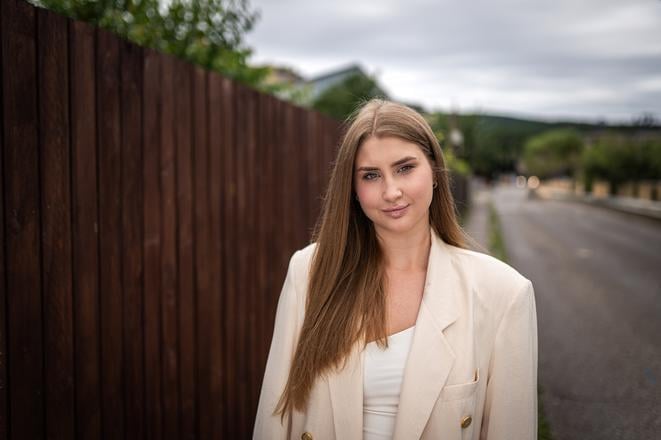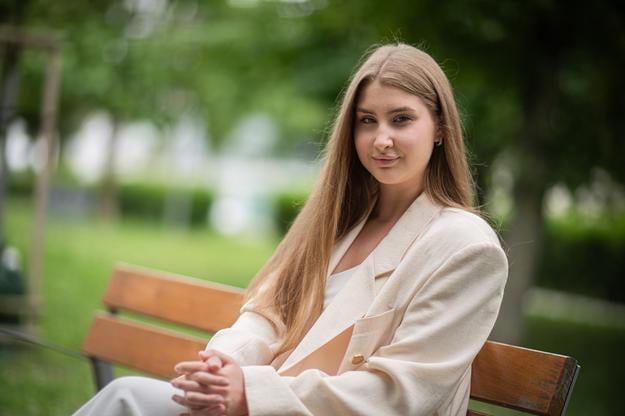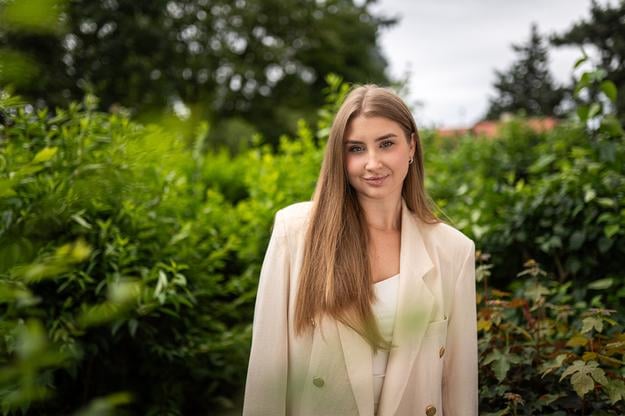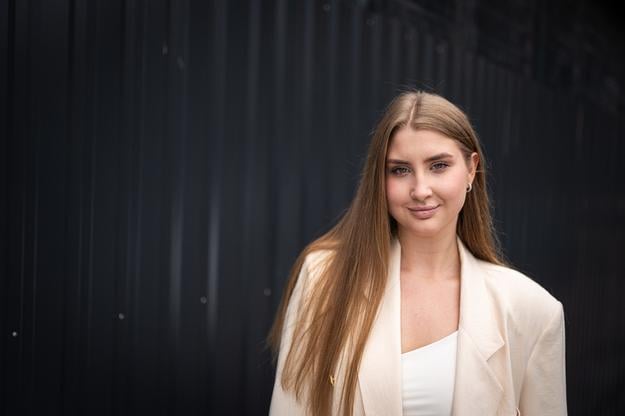Yelyzaveta ‘Liza’ Derevynska says that if she had not been working with refugees at the League for Human Rights in Slovakia, she would probably have already returned to Kyiv.
“What really keeps me here is being helpful,” she admits.
Bratislava is now her second home, and when she travels, she looks forward to coming back ‘home’. Although she still considers the capital of Ukraine her home, she now feels more like a visitor there.
“The war took away the feeling of Kyiv being my home,” she says. Her parents, her mother Oksana and father Yuriy, made the decision for her to leave in March 2022. “They said that they wanted to save my life and wanted me to leave. That convinced me.”
Before the war Liza had no plans to depart her native Kyiv.
Decision made at night
The decision concerning the then 20-year-old Liza embarking on the journey, and without her parents, was made one night. The family had a meeting at 11 o’clock in the evening. The very next morning, after a night of tears, she left with her cousin and her cousin’s children, heading toward Slovakia.
After the outbreak of the full-scale war, the family first went to their cottage near Boryspil, a small town an hour’s drive from Kyiv. It is primarily known for its international airport, the largest in the country.
“It was very dangerous there at that time,” Liza recalls. “It was the second week of the war, and no one knew what would happen or how things would unfold; everyone was scared. That evening, the decision was made that we were leaving. I didn’t want to go, but my parents persuaded me,” she adds.
The trip from the cottage to the flat in Kyiv took them five hours instead of one; the roads were already full of people fleeing. There were traffic jams and cars everywhere, people in a panic.
From parents’ darling to independent woman
Liza, her cousin, her cousin's two children, and other family members travelled in two cars as a group: through Moldova and Romania, their journey to Modra, a town near Bratislava and their final destination, took three days.
“At that time, we all thought it would last a month and that we would return. I left with just one backpack and a few things,” she says.
When she left, she was studying marketing and working as a social media manager for a cosmetic studio. She enjoyed her work and dreamed of continuing.
“I was like ‘mommy and daddy’, we lived together, and my life was carefree,” she depicts herself.
Life in Slovakia turned her life upside down; she had to be independent. They moved from Modra to Bratislava with her cousin after a week. Today, she lives alone, preparing for a master’s degree in marketing and managing a large Telegram channel for Ukrainian refugees at the League for Human Rights. The channel has 7,000 followers and has already helped more than 15,000 people.
She admits that she sometimes feels lonely, but today she tries to find home mainly within herself.
Different Kyiv
“My first return to Kyiv after a year was already a return to a different place,” she describes.
She says that it is because people have changed; they are closed off and nobody smiles. Life seems more or less normal, but rocket attacks continue along with the threat of them, and it is not safe.
“People try to live a normal life, but they are pretending more than actually living a normal life. Everyone feels inside that it's not normal,” Liza observes.
“My parents have changed too,” she says, holding back tears. “They have aged mentally and physically; you can see it on their faces.” Her mother works as a consultant in a store selling gold jewellery, while her father is a truck driver. “I don’t even try to persuade them. Daddy won’t leave; he’s convinced he has to stay, and Mom doesn’t want to leave him there,” she explains.
Her father is already 60 years old, yet on the third day of the war, he went to the military recruitment office to volunteer for combat. Due to his age, however, they did not accept him.
Hundreds of people receive help
While her parents battle to survive in Kyiv, Liza directs her assistance towards Ukrainians in Slovakia. She has been working at the League for Human Rights since November 2022. In addition to managing the Telegram channel, she also handles communication with donors and initiates project collaborations.
‘Her’ Telegram channel is the second largest in Slovakia. She describes it as a page where posts are visible like on Facebook, but commenting is not allowed. This feature was disabled to prevent the spread of false information. However, people can subsequently contact each other or send a message or call the League for Human Rights.
She receives a high volume of messages daily, and the feedback is positive. Liza smiles as she adds that this does not surprise her because, in her opinion, the team of lawyers at the League provides quality service.
Half the team she works with are Slovaks, and the other half are Ukrainians. The atmosphere is supportive and friendly.
Tax returns and undeclared work
While at the beginning of the war, incoming people from Ukraine primarily addressed issues such as accommodation and health care, after two years, refugees are facing different problems. Today, at the League, they help with tasks such as filing of tax returns, establishing businesses, and preventing illegal employment.
Liza mentions that dealing with the war every day is demanding, even though she herself is not in direct contact with refugees. “That’s the job of our lawyers. The topic of war is always on my mind, yet the fact that I'm helpful fulfils me. So, I'm involved in the theme of this war, but paradoxically, it helps me because it fulfils me,” she explains.
The League for Human Rights has two offices, one located on Bottova Street in Bratislava, within a large-capacity centre for refugees. Alongside non-governmental organisations, there is also the Foreigners’ Police, issuing temporary asylum and refugee status. Liza asserts that this centre is unique, combining multiple services in one place.
Happiness in moments
“War will never leave the mind of anyone who has experienced it,” believes Liza. She vividly remembers when they left Kyiv for their cottage in February 2022, the day after the war broke out. The first weeks in the capital were very dangerous; helicopters were flying just three metres from the windows of their flat, and they heard explosions. She recalls how her parents went to buy groceries, and there was a strong explosion a kilometre from their home. “I remember clutching my cat very tightly; at that moment, you don’t think, you just focus on survival,” she describes the horror.
On the other hand, she does not remember her first two months in Slovakia. Today, she knows that she was under tremendous stress, even though she thought she was managing at the time.
“Even my cousin tells me, ‘you were crying all the time.’ I don’t remember that at all,” she says.
Today, she tries not to talk to her parents about her problems and ‘whine’, understanding how challenging their situation is. She is more interested in how they are doing. They video-call each other daily. She tells them about her work experiences, and they update her on any attacks.
She tries to enjoy life.
“When the war started, I realised that you have to enjoy every day because you never know what will happen. But at the same time, thoughts of war are always in my head,” she explains.
What makes her happy?
“It’s about moments, not a continuous state. I love to travel; happiness for me also comes from simple meetings with friends over coffee or when something succeeds at work. Many things can bring me happiness,” she says.
Support in group chat
Liza also describes her communication among young Ukrainians, her university classmates. Most of the boys remained in Ukraine for logical reasons, due to mobilisation. The girls are living around Europe, in France, Germany, and Austria.
Once a month, they write to a group of over 30 people. Everyone shares how they feel mentally, what is happening with them, where they are, what they are doing, and where they work.
“Everyone writes a text like this about themselves. We exchange information, and then we can help each other,” she explains. “For example, when my classmate’s father died in the war, we supported her,” she describes the strength of their friend group. She says that requests for donations often appear in the group. “I have very active classmates who contribute a lot financially and who are also volunteers, both in Ukraine and abroad,” she notes.
She remains in constant contact with close friends, they travel and visit each other to meet in person at least once a year.
Fighting Russian propaganda
“I'm not tolerant, but I understand why this happened,” says Liza, regarding people’s strong inclination toward Russian propaganda in Slovakia. However, she claims that this is not only a problem among Slovaks. Even in the Ukrainian community, and among people who fled here from the war, some are inclined towards pro-Russian narratives.
“It's a general problem that we allowed the Russian narrative to infiltrate the Ukrainian and European information space. A big mistake. Russian propaganda works very well. For some groups, it's extremely effective, even though some of it is really super stupid and crazy,” she believes.
Currently, she is working at the League for Human Rights on a project aimed at creating and disseminating texts to debunk myths about the Ukrainian war and pro-Russian narratives.
She sees the same reasons why people, both Slovaks and Ukrainians, are willing to believe Russian propaganda – nostalgia for communism and the “strong positive Russian army of the past”. She adds that in Ukraine, it is usually older people who lived closer to the border and who still see Russian soldiers as ‘brothers’.
“It’s not easy to see,” Liza responds to the question of how she perceives talks of peace being leveraged as an instrument for political gain. “People are really dying in Ukraine every day due to Russian attacks,” she says, adding that she becomes angry when politicians exploit this as a tool in Europe.
“I feel that it's unfair that people use the war to achieve something. To some extent, I accept it as a new reality that we are all exposed and somewhat accustomed to, even though we don’t like it. People think the war will never concern them. I also hope it will never concern them, but when support for Ukraine ends, no one knows what will happen.”
Plans mean nothing in wartime
Liza admits that she no longer tries to predict the end of the war to avoid disappointment.
“We are waiting for and trusting the Ukrainian army and diplomacy to end the war as soon as possible. As for myself, I'm doing everything I can here to help the Ukrainian community,” she resolutely says.
However, she is not formulating plans to return or for where she will stay. “I don’t have such long-term plans. After the war started, I realised that plans mean nothing, and reality can change very quickly.”
She knows that in Slovakia she lives in a bubble where she only experiences a tolerant and pleasant behaviour towards Ukrainians.
Why she follows Slovak politics
Liza says that Slovak politics concern her.
“Of course, since I live here, I try to follow and understand the situation in this country. I see that prospects are not very good at the moment, not even for our Ukrainian community, but we try to be active and support good things,” she says.
She attempted to support her colleagues when there were anti-government protests.
“I do care,” concludes Liza.
This story was produced with the support of UNESCO under the Support for Ukrainian Refugees Through Media programme, funded by the Japanese government.
© Sme




